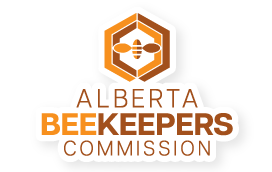New Beekeeper Services
By Renata Borba, Tech Transfer Program Lead, ABC
The Alberta Beekeepers Commission recently launched two new service offerings as part of the Technology Transfer Program (TTP). These tailor-made services have been specifically designed to support the needs of commercial beekeepers in Alberta and provide valuable monitoring, testing, and evaluation of pests and pathogens in your honey bee colonies, as well as best practice techniques for healthy hive management.
Colony health monitoring:
The purpose of this program is to provide temporal monitoring and evaluation of pests and pathogens in the honey bee hive. Colonies will be sampled in early spring and late summer for major pests and pathogens. An effective Integrated Hive Management program includes continuous evaluation and planning steps so that adjustments can be made as necessary to ensure the success of the beekeeping operation. As part of this program, we will also collect colony management data from you, as a way to provide to you an evaluation of your pest management practices and pest/pathogen levels. The goal of the colony management data collection is to investigate possible association between your management practice and your pathogen levels.
Continuous colony monitoring and the implementation of best management practices has been shown to improve bee health, pollination, and honey production, and reduce annual bee losses, use of antibiotics, and overall operating costs for beekeepers. Apiary sampling will occur twice a year: Samples will be collected in early spring and late summer. Two types of samples will be collected from 10 colonies at each apiary: live bee sample (viruses, Nosema, AFB, EFB) and alcohol wash (Varroa). Live bee samples from all 10 colonies in each yard will be combined/pooled into one sample per yard. Alcohol wash samples will not be pooled and will be assessed on-site (for immediate data result) and re-assessed later in the laboratory using a standard procedure for a more consistent assessment. If your Varroa levels are high, we will also collect extra live bee samples to perform a miticide resistance test, unless we receive instructions from you not to follow up with a resistance test. Test results for Nosema, AFB and EFB should be expected within 2 ½ weeks from time of sampling. Results for viruses may take an additional 2-3 weeks.
This service is space-limited and the number of registrations will be capped. To register your interest, please contact Renata at renata.borba@albertabeekeepers.ca.



Colony Health Monitoring package options and cost (EP = Eligible Producer; Non-EP = Non Eligible Producer):
| Description | Cost/Yard (+GST) | |
|---|---|---|
| Option 1 | • 3 viruses • AFB (incl. resistant test if colony is tested positive) • EFB • Nosema • Varroa | $395 (EP) $410 (Non-EP) |
| Option 2 | • AFB (incl. resistant test if colony is tested positive) • EFB • Nosema • Varroa | $285 (EP) $300 (Non-EP) |
| Option 3 | • Nosema • Varroa | $145 (EP) $160 (Non-EP) |
| Additional diagnostics* | (Please check the NBDC website for additional services & list on the left the type of service requested) |
IPM on-site training:
The first step in an Integrated Hive Management program requires taking the time to familiarize yourself with the bees, the colony, and the pests. Protecting honey bees from pathogens and disease is an integral component of the hive management, which requires dedication to learning about disease identification, diagnosis and treatment. Therefore, beekeepers should have a basic understanding of honey bee biology (e.g., bee life cycle), disease identification, prevention and control procedures.
This on-site training will cover Integrated Pest Management (IPM) principles, basic honey bee biology, pathogens (AFB, EFB, Chalkbrood, Nosema, Viruses), parasites (Varroa mite), pests (small hive beetle, wax moth), IPM strategies and plan. There will be hands-on interactive learning opportunities, including frames containing bee diseases and pests.
This service is also space-limited and is currently sold out. May you be interested in the IPM on-site training, please contact Renata directly and she will add you to her waiting list for next year.




